
The politics of Egypt is based on republicanism, with a semi-presidential system of government, established following the Egyptian Revolution of 2011, and the resignation of President Hosni Mubarak. The President of Egypt is elected for a maximum of two four-year terms and the Parliament is unicameral and unbiased. The President can appoint up to 5% of the total number of seats in Parliament, and can also dissolve it. Parliament can also impeach the President. Egypt was traditionally ruled by royals until 1952, but the first free elected President was in 2006. The Parliament of Egypt is the oldest legislative chamber in Africa and the Middle East.

Muhammad Hosni El Sayed Mubarak is a former Egyptian military and political leader who served as the fourth President of Egypt from 1981 to 2011.
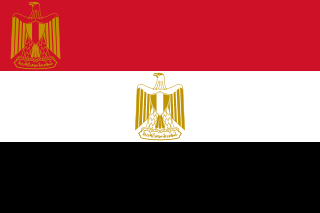
The President of the Arab Republic of Egypt is the head of state of Egypt. Under the various iterations of the Constitution of Egypt, the president is also the Supreme Commander of the Armed Forces and head of the executive branch of the Egyptian government. The current president is Abdel Fattah el-Sisi, in office since 8 June 2014.
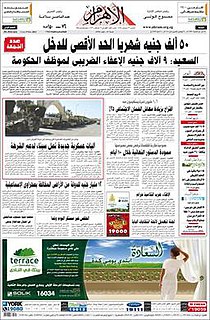
Al-Ahram, founded on 5 August 1875, is the most widely circulating Egyptian daily newspaper, and the second oldest after al-Waqa'i`al-Masriya. It is majority owned by the Egyptian government.
Mohamed Safwat El Sherif is a former Egyptian politician, having served as Chairman of the State Information Service, Minister of Information, Speaker of the Egyptian Shura Council, and Secretary General of the ruling National Democratic Party (NDP), and Head of the Supreme Press Council and a close aide to President Mohamed Hosni Mubarak.
The National Council for Human Rights (NCHR) is an Egyptian human rights organization established in 2003 with a mission of promoting and maintaining human rights in Egypt. The NCHR publishes annual reports concerning the current status of human rights within the country. Former UN Secretary General Boutros Boutros-Ghali played a "significant role" in creating the organization, and served as its president until 2012. Since 2012, the organization has been headed by Hossam El Gheriany.

A presidential election was held in Egypt in two rounds, the first on 23 and 24 May 2012 and the second on 16 and 17 June. The Muslim Brotherhood declared early 18 June 2012, that its candidate, Mohamed Morsi, won Egypt's presidential election, which would be the first victory of an Islamist as head of state in the Arab world. It was the second presidential election in Egypt's history with more than one candidate, following the 2005 election, and the first presidential election after the 2011 Egyptian revolution which ousted president Hosni Mubarak, during the Arab Spring. Morsi, however, lasted little over a year before he was ousted in a military coup in July 2013.
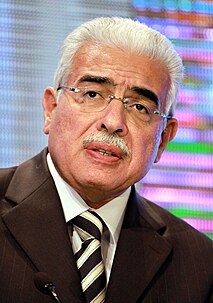
The Egyptian parliamentary elections of 2010 first voting round was held in Egypt on 28 November 2010 and the second round was held on 5 December 2010.

A parliamentary election to the People's Assembly of Egypt was held from 28 November 2011 to 11 January 2012, following the revolution that ousted President Hosni Mubarak, after which the Supreme Council of the Armed Forces (SCAF) dissolved the parliament of Egypt. However the dissolution was ruled unconstitutional and Parliament was reinstated. Originally, the elections had been scheduled to be held in September 2011, but was postponed amid concerns that established parties would gain undue advantage.
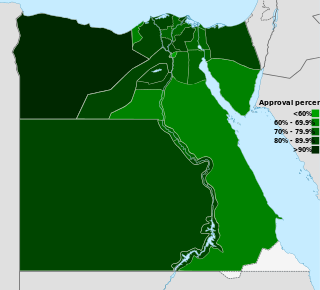
A constitutional referendum was held in Egypt on 19 March 2011, following the 2011 Egyptian revolution. More than 14 million (77%) were in favour, while around 4 million (23%) opposed the changes; 41% of 45 million eligible voters turned out to vote.

The Free Egyptians Party is an Egyptian liberal party, founded after the 2011 Egyptian revolution. It supports the principles of a liberal, democratic, and secular political order in Egypt. The Free Egyptians Party is the largest party in the House of Representatives.

The Egyptian Social Democratic Party is a social liberal and a social democratic party in Egypt. It was founded after the 2011 Egyptian Revolution by the merger of two minor liberal parties, the Liberal Egyptian Party, and the Egyptian Democratic Party on 29 March 2011.
Following the 2011 Egyptian revolution, the Muslim Brotherhood in Egypt became one of the main forces contending for political power in Egypt against the Supreme Council of the Armed Forces (SCAF) and other established centers of the former Hosni Mubarak regime.
Mohamed Bahaa Eldeen Abou Shaka is an Egyptian lawyer and politician. He is a professor of public law, and the current President of the New Wafd Party.
Hossam El-Gheriany is an Egyptian judge. Winning recognition as a champion of judicial independence in the regime of President Mubarak, he became head of the Supreme Judicial Council and the Court of Cassation. Today he also heads the Constituent Assembly of Egypt and is president of the National Council for Human Rights.
Mohammed Refaat El-Saeed was an Egyptian politician, scholar and writer. He served as the general secretary of the National Progressive Unionist Party (Tagammu). El-Saeed held two doctorates in history, and was a part-time lecturer at the American University in Cairo. El-Saeed was a frequent contributor to al-Ahali, the Tagammu party organ.

A constitutional referendum was held in Egypt in two rounds on 15 and 22 December 2012. Egyptians living abroad were scheduled to vote between 8 and 11 December. Voting for expatriates had been delayed until 12 December 2012 and was extended until 17 December 2012. Voters were asked whether they approve of the draft constitution that was approved by the Constituent Assembly on 30 November 2012.
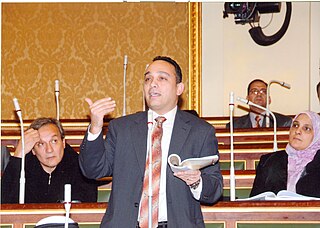
Freddy Safwat Naguib Elbaiady to an Egyptian family. He is an Egyptian political and social activist. Resigned Member of the Shura Council, the upper house of the Egyptian parliament, the senate house,.














